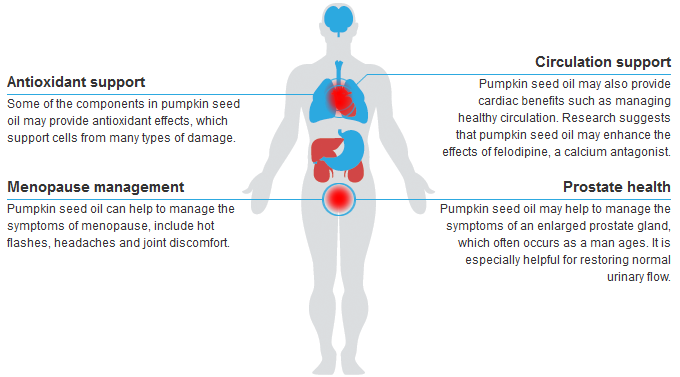 The cultivated plant known scientifically as Cucurbita pepo includes pumpkins and squashes. Pumpkin seed oil is primarily made in central Europe, including Austria, Croatia, Hungary, Romania, and Slovenia. Austria and Slovenia also export significant quantities of pumpkin seed oil.
The cultivated plant known scientifically as Cucurbita pepo includes pumpkins and squashes. Pumpkin seed oil is primarily made in central Europe, including Austria, Croatia, Hungary, Romania, and Slovenia. Austria and Slovenia also export significant quantities of pumpkin seed oil.
The commercial production of pumpkin seed oil is more than 300 hundred years old. The Styrian oil pumpkin, known botanically as Cucurbita pepo subsp. pepo var. 'styriaca', has been developed specifically to produce pumpkin seed oil. It is produced by collecting the seeds and roasting them. The hulls are removed, and the kernels are cold-pressed to extract the oil.
The color of pumpkin seed oil varies according to its thickness, a phenomenon known as dichromatism. A thin layer of this oil is dark green, which gradually changes to red as the layer becomes thicker. The raw oil has a strong nutty taste that becomes bitter when browned. Pumpkin seed oil is often used to make a salad dressing by combining it with cider vinegar, olive oil, or honey. A few drops of this oil are also added as flavoring to dishes such as pumpkin soup and ice cream.
The specific components of pumpkin seed oil primarily include linoleic acid, which may comprise up to 62 percent of its volume. Oleic acid may account for as much as 39 percent of pumpkin seed oil, and the amount of palmitic acid may be as high as 18 percent. The most obvious effect of pumpkin seed oil is increased urination, known medically as a diuretic effect.
Support for prostate health is the most common reason for taking pumpkin seed oil. Additional benefits of this oil include healthy circulation, management of menopausal symptoms, and antioxidant effects.
Some of the components in pumpkin seed oil may provide antioxidant effects, which support cells from many types of damage.
Pumpkin seed oil can help manage the symptoms of menopause, including hot flashes, headaches, and joint discomfort.
Pumpkin seed oil may also provide cardiac benefits such as managing healthy circulation. Research suggests that pumpkin seed oil may enhance the effects of felodipine, a calcium antagonist.
Pumpkin seed oil may help to manage the symptoms of an enlarged prostate gland, which often occurs as a man ages. It is especially helpful for restoring normal urinary flow.

Benign prostatic hyperplasia (BPH) is one of the most common conditions that indicate you may need pumpkin seed oil. This condition is characterized by an enlarged prostate gland due to the proliferation of prostate cells. It typically affects men over 50 years of age, and its most obvious symptom is usually uncomfortable urination. An unhealthy cholesterol profile is also an indication that you may benefit from pumpkin seed oil.

In our pursuit of vibrant health, many of us strive for a balanced diet packed with nutrient-rich foods. However, even the most wholesome diet may still leave us lacking in essential nutrients, particularly Omega-3 fatty acids. Healthy Eating is O...

Support for Heart Health Rice Bran Oil Background and Benefits Rice bran oil comes from the brown layer of a rice grain that lies between the husk and the kernel. It is a common cooking oil in Asia, including China, Japan, and India. Rice bran oil has a mild flavor and a smoke point of 450 degree...

Support for a Healthy Cholesterol Profile and Liver Function Lecithin Oil Background and Benefits Lecithin is a generic term that applies to any fatty substance composed of fatty acids, phospholipids, triglycerides, glycolipids, glycerol and choline. Specific classes of lecithin include phosphati...
Shipping calculated at checkout